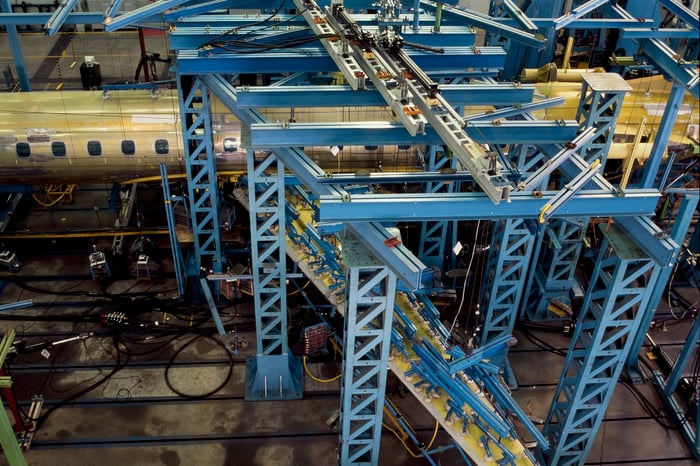Spirit AeroSystems (SPR -1.84%) has reworked its deal to buy the aerostructures business of Bombardier (BDRAF -1.55%) (BDRBF -3.28%), finding a way to get the deal done despite significant COVID-19 headwinds.
The agreement allows Spirit to salvage at least part of its grand plan to diversify away from former parent Boeing (BA -2.87%), which should be a long-term positive for the company. But it does little to change the near-term outlook for a company that is going to have a hard time gaining altitude as long as airlines are grounded.
Weak demand and price cuts
In October 2019, Spirit announced plans to buy the aerostructures business of Bombardier for $1.09 billion, including $500 million in cash and $590 million in assumed liabilities. The deal was designed to boost Spirit's business with Airbus (EADSY -0.67%), including making wings and other components for the promising A220 jet.
But the COVID-19 pandemic has brought airline expansion to a halt, and crippled airplane manufacturers. Airbus has taken cost cutting steps including cancelling a A320neo thrust reverser set to be manufactured by the Bombardier unit, a blow to the business. And overall plane sales are expected to drop significantly in the years to come.

Image source: Getty Images.
As a result, Spirit and Bombardier have agreed to reduce the cash portion of the purchase price to $275 million, meaning the total deal value has fallen to $865 million. All conditions to close the deal have been met, and Spirit expects to complete the acquisition by Oct. 30.
"As with the rest of the aerostructures industry, performance will be adversely impacted due to COVID-19 for the coming years, but we worked closely with Bombardier on a mutually agreeable price reduction that mitigates this impact," Spirit CEO Tom Gentile said in a statement.
Risky business
In one sense, getting the deal done is vital to Spirit and its hopes to get out from under the shadow of its former parent. Fifteen years after being spun out as an independent, Spirit still generates upwards of 75% of its revenue from Boeing, and the company has been hard hit by Boeing's 737 MAX problems.
The Bombardier deal, along with a separate $650 million deal to acquire Asco Industries, would boost Spirit's Airbus exposure and lessen the risk any one program like the 737 MAX could sink the business. The Asco deal fell apart late last month, but Spirit's overall portfolio will get a boost should the Bombardier deal close.
"This acquisition accelerates our strategic transformation by increasing our Airbus content with the A220 composite wing and growing our aftermarket business," Gentile said. "The transaction secures Spirit's position as the world's leader in composite structures for aircraft and as one of the leaders in integrated wing technologies."
But Spirit shares sold off more than 5% on the news. Investors are likely worried about the cash outlay in a time of uncertainty, and fearful that it could be a turbulent integration. With Boeing and Airbus production rates already reduced and more cuts possible, Spirit in the near term could be taking on a new cash drain.
A stronger company, but still a weak stock
Spirit AeroSystems has lasted this long because Boeing needs it as much as it needs Boeing. Spirit, as the maker of the 737 MAX fuselage, has a vital and hard to replace spot in the Boeing supply chain.
The company will soon have a similar relationship with both Airbus and Bombardier. When the deal closes, Spirit will acquire 3.4 million square feet of manufacturing space in Northern Ireland, Morocco, and Texas used to make large components for Airbus platforms and Bombardier jets.
Spirit AeroSystems faces an ugly next few years, as commercial air travel seems unlikely to fully rebound until 2024 at the earliest and new plane demand is likely to be soft as airlines wait out a recovery and then rebuild bruised balance sheets.
I believe Spirit has the wherewithal, and the deeper-pocketed customers who rely on it, to survive the downturn. But it is hard to imagine the stock going anywhere until there are clear signs a recovery is at hand. Getting the Bombardier deal done is a good move, and should make Spirit AeroSystems a better company in the long run. But there is little to no reason for investors to buy in right now and wait out a recovery.





